In Memoriam: Lata Mangeshkar – My Favourite Solos with Ten Composers
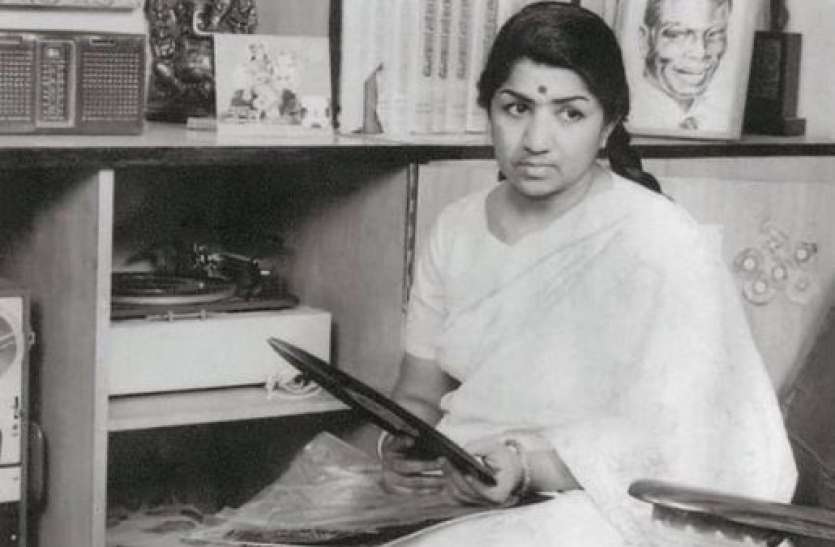
By Madhulika Liddle
The ‘Nightingale of India’ is no more. Lata Mangeshkar, aged 92, passed away on February 6.
What can be said about Lata that has not already been said? That she was a singer par excellence, that there was never quite anyone else like her? That the sheer volume of her work, in so many languages, across so many years, coupled with the quality of her work, sets her apart from not just her contemporaries, but also those that have followed? That there is unlikely to ever be any other singer (at least female singer) who will be able to match Lata Mangeshkar?
I will not repeat what others, including bloggers like Anu and AK have already so beautifully expressed by way of tribute; let it suffice that for me, too, Lata’s voice was an intrinsic part of growing up, of life itself.
I tend not to eulogize people, even those whom I like a lot. The same goes for Lata Mangeshkar. There have been various aspects of her career that I have not liked, and there are many songs of hers, especially from the latter years, that I do not like at all. But I cannot deny that I have a huge amount of respect for Lata in her heyday, as a singer: the sweetness of her voice, the awe-inspiring control, the seemingly effortless way of singing the most daunting of tunes. Many of my favourite Hindi film songs from the 40s onward have been sung by Lata. And many of those, I cannot imagine anyone else singing as exquisitely as she has.
Of course I’ve done a Lata song list before, back in 2010, of Lata in Ten Moods. This one, therefore, is somewhat different: this one is of Lata solos, sung for ten different composers. And, to make it a little more unique, I’ve made sure that I’ve not included any of the songs I included in my earlier Lata songs list. As always, these songs are all from pre-1970s Hindi films that I’ve seen (with one exception, on the cusp), and are in no particular order.
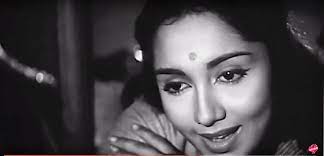
1. O sajnaa barkha bahaar aayi (Parakh, 1960): With Salil Choudhary. “In my career of 30 years in music, I have not known a singer of her capabilities”, said Salil Choudhary of Lata Mangeshkar, the singer for whom he admitted to having reserved his most difficult songs, the ones he thought would challenge her. Of their many beautiful songs together, this is one of my absolute favourites: a song that Lata sang in both Hindi (for Parakh) and in Bangla. The sweetness of Lata’s voice, the youthful shyness she is able to infuse in every word: the young and pretty Sadhana, lip-syncing to Lata’s voice, really looks as if she’s singing, the voice is so believably hers.
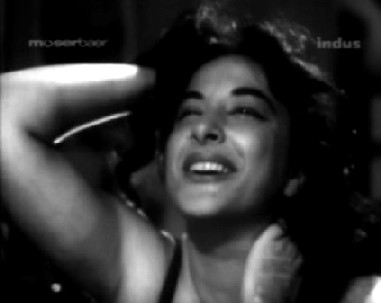
2. Awara ae mere dil (Raat aur Din, 1967): With Shankar-Jaikishan. Lata Mangeshkar sang for the composer duo of Shankar-Jaikishan from as early as the 1940s, when they took her on for Raj Kapoor’s Barsaat, and right through the next several decades. In the course of the years, she sang some truly iconic songs for them, from the poignant Ajeeb daastaan hai yeh to the heartbreaking Ruk jaa raat thehar jaa re chanda, to the slightly bawdy Main kaa karoon Ram mujhe buddha mil gaya, which Lata confessed to having been very uncomfortable about singing.
And then there was this one, which appeared in two versions in Raat aur Din. In one version, on a dance floor, Laxmi Chhaya pirouettes and sways, lip-syncing to Lata’s voice as she talks of a heart that’s always restless, always looking for greener pastures. In the other version, there’s a wistful Nargis, lost and adrift in a world that makes no sense to her, but which she’s too fuzzy to do anything except smile at.
I love the different vibes Lata brings to this song, letting it fit perfectly into a dance club ambience in one instance, letting her voice swell into an out-in-the-streets freedom in the other.
3. Ae mere maalik mere parvardigaar (Sohni Mahiwal, 1958): With Naushad. Naushad was another of those composers with whom Lata had a long and memorable stint: a composer who challenged Lata’s voice, giving her some very difficult songs to sing—and some iconic ones, like the classic Pyaar kiya toh darna kya, probably the song most popularly associated with the Lata-Naushad combination.
This song from Sohni Mahiwal may not be as well-known as most of Lata’s songs for Naushad, but to me, it is a fine example of Lata’s control over her voice. Naushad tailors this song beautifully, reducing the musical instruments to the bare minimum so that they do nothing more than frame Lata’s voice, which is perfectly restrained, perfectly in tune. Unbelievably good.
4. Naina barse rimjhim rimjhim (Woh Kaun Thi?, 1964): With Madan Mohan. Lata Mangeshkar had a very special equation with her moonhbola bhai, Madan Mohan: he composed some lovely songs for her, all the way from the wonderful tunes of Raj Khosla’s Sadhana-starrer suspense thrillers Woh Kaun Thi? and Mera Saaya to the melodramatic (yet musically beautiful) songs of Anpadh—and many more.
For me, the seductive, utterly sublime Lag jaa gale from Woh Kaun Thi? is the best song from this film, but since I’d already included that in my other Lata list, here is another of my favourites from the same film. The seduction is there here too, but in a different way: a poignant, elusive style. Lata’s voice has to be heard to be believed. And the way she lingers, gentle, echoing, over the last barse, barse of the chorus: stunning.
There is an interesting anecdote about this song: Lata wasn’t able to find time to record the song before the shooting. Madan Mohan, therefore, hurriedly recorded the song in his own voice, and it was this version to which Sadhana lip-synced during the shooting of Naina barse, much to the surprise and amusement of local bystanders.
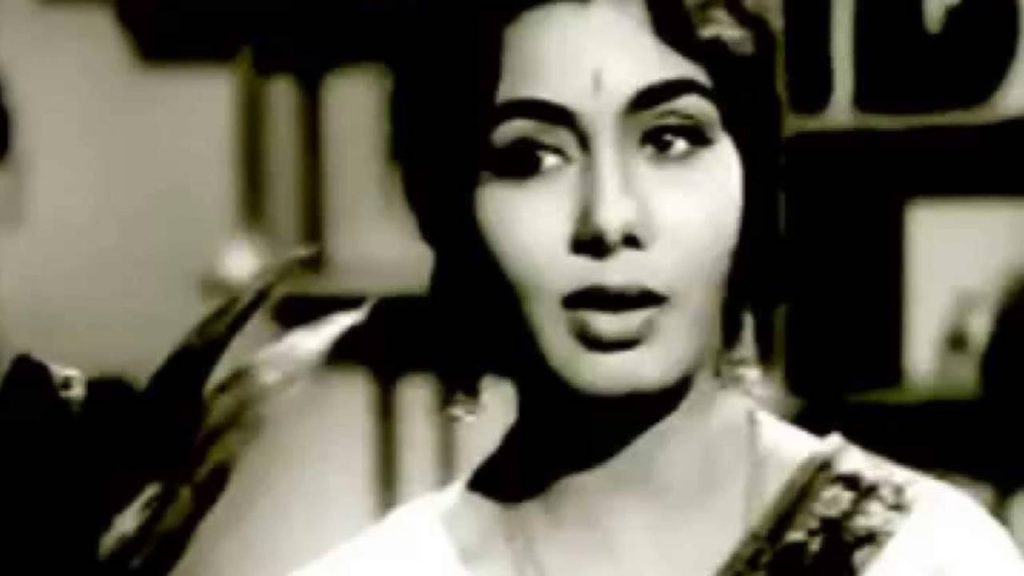
5. Dil ka diya jalaake gaya (Akashdeep, 1965): With Chitragupt. Chitragupt, while a prolific and very talented music director, got relegated to composing for mostly B-grade films (several of them mythologicals) fairly early on. He is to be given credit for having composed some wonderful songs even when the films he was composing for weren’t great. Here is one song I like a lot from an otherwise forgettable film, which nevertheless had excellent music. Nimmi in Akashdeep acts a blind woman, who suddenly receives a confession of love from the man she has been in love with all this while. The somewhat awed, shy, I-can’t-believe-my-good-fortune sentiment that comes through in this song is lovely. Just listen to that kaampte labhon ko main khol rahi hoon, and you can feel her wonder at the good fortune that is hers.
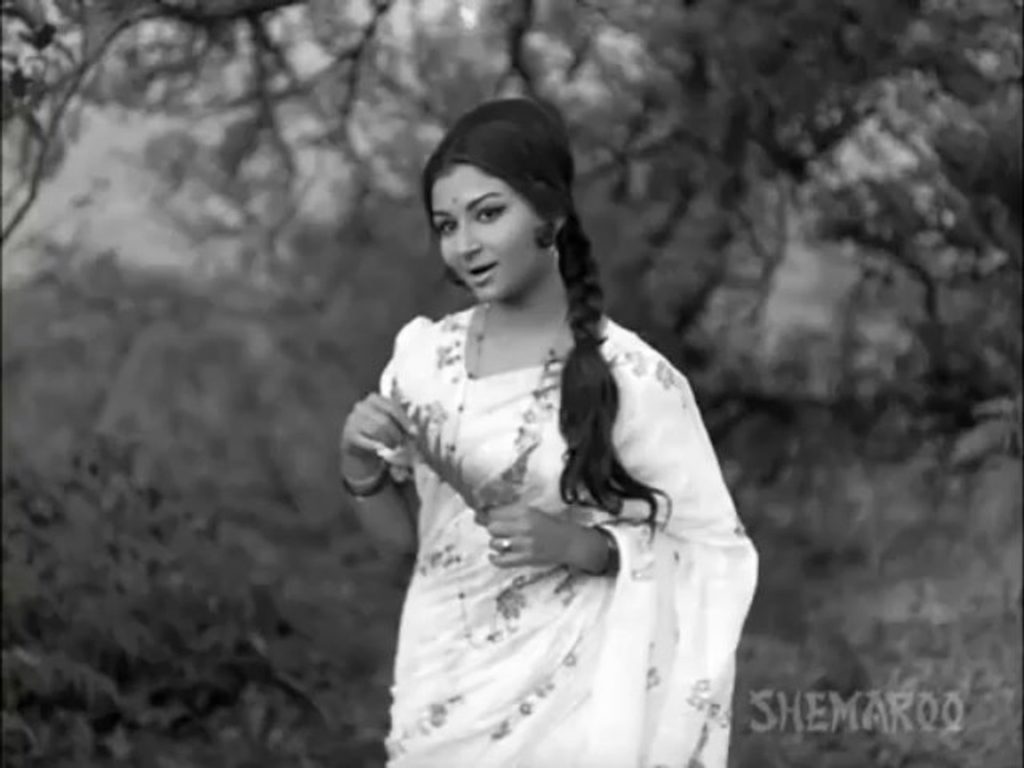
6. Kuchh dil ne kaha (Anupama, 1966): With Hemant. Music director and fellow playback singer Hemant Mukherjee was another of those with whom Lata had a memorable association. They sang many duets together, and Lata sang many songs in the films for which Hemant composed. In addition, they sang lots of Bangla songs too, some of them composed by Hemant.
But to get back to Kuchh dil ne kaha, one of Lata’s best songs to Hemant’s music. This song, gentle and quiet, is one that I especially love. Lata, singing playback for Sharmila Tagore’s character, withdrawn and lonely, conveys the depth of emotion in Kaifi Azmi’s lyrics beautifully: the softness and beauty here barely conceal the loneliness underneath. You can hear the pain in this young woman’s heart, neglected and rejected by her father, who can only show his love for her when he’s drunk.
7. Piya tose naina laage re (Guide, 1965): With SD Burman. One of SD Burman’s first big hit songs had been with Lata Mangeshkar: she had sung Thandi hawaayein lehraake aayein for him in Naujawan (1951). She continued to sing for SDB across the years, even though their association was marred by a split that lasted from 1958 to 1962. Finally patching up, they came together again, and SDB composed some memorable songs for Lata through the 60s. Guide (which I personally love primarily for SDB’s music) had some superb songs by Lata, including the iconic Kaanton se kheenchke yeh aanchal and the bitter, betrayed Mose chhal kiye jaaye. The long, intricate Piya tose naina laage re, however is what I choose here: Lata’s a virtuoso here, her voice now alluring, now teasing, restless, yearning.

8. Chalte-chalte yoon hi koi mil gaya thha (Pakeezah, 1972): With Ghulam Mohammad. Pakeezah was Ghulam Mohammad’s tour de force: one brilliant song after another, each song a hit, each song an immortal one. And Lata Mangeshkar ruled this score, with everything from the quietly joyous sunniness of Mausam hai aashiqaana to the seduction of Thaare rahiyo, the defiance of Aaj hum apni duaaon ka asar dekhenge. For me, personally, it’s very difficult to choose one favourite from all these songs, but Chalte-chalte yoon hi koi mil gaya thha was the first song from Pakeezah that I learnt the lyrics to, long ago in my teens, so I have a special fondness for this one. Its lyrics are beautiful, the music is impeccable, and Lata’s voice is stunning. The restraint, the softness, the music of her voice.
Who was it who said “kambakht besuri hi nahin hoti” about Lata? This is one song that proves it. There isn’t a false note here.
9. Aurat ne janam diya mardon ko (Sadhana, 1958): With N Dutta. Sahir Ludhianvi’s brutally hard-hitting lyrics are usually the reason for the praise this unforgettable song receives; most people tend to overlook both N Dutta’s very restrained music as well as Lata Mangeshkar’s rendition. She sings with so much feeling: the cynicism, the sorrow, the quiet fury of a woman railing against the patriarchy of a world of men who engineer the world to suit their own ends. I also find one more aspect of Lata’s singing of this song that is admirable: her diction. Every word is clear, every word is so perfectly enunciated that there is no blurring, no guessing at what this word might be, or that one.
10. Tere sur aur mere geet (Goonj Uthi Shehnai, 1959): With Vasant Desai. And, to end, a song from a composer generally associated with songs that reference classical Hindustani music a good deal. Vasant Desai, who created some outstanding songs for most of V Shantaram’s films, had Lata sing such songs as the devotional Ae maalik tere bande hum and the romantic Nain so nain nahin milaao. Also among Vasant Desai’s greatest hits were the songs he composed for Goonj Uthi Shehnai. With the maestro Ustad Bismillah Khan playing the shehnai Rajendra Kumar’s character plays in this film, Lata was the perfect match for the shehnai, as Ameeta’s voice: how melodious she is, how perfectly in tune.
Article courtesy: https://madhulikaliddle.com
Short URL: https://indiandownunder.com.au/?p=17480
